Reuters/London
Bank of England Governor Mervyn King’s final rate-setting meeting ended in a subdued fashion yesterday with no change to policy despite the governor’s calls for more stimulus.
The bank’s decision to leave policy steady before the arrival next month of King’s successor — former Canadian central bank chief Mark Carney — was widely expected by economists, as recent data suggests Britain’s recovery is gathering strength.
“While the Bank of England’s Monetary Policy Committee (MPC) hopefully gave Sir Mervyn King a nice leaving present, this did not include the further monetary stimulus that he has been asking for since February,” said Howard Archer, chief UK economist at IHS Global Insight.
How King cast his final vote — after attending every MPC meeting since the BoE gained independence in 1997 — will not be confirmed until minutes of the meeting are published on June 19.
Since February he and two other members of the nine-member committee have voted at each meeting for an extra £25bn of bond purchases on top of the £375bn worth bought from March 2009 to October 2012.
Their argument has been that even if a fragile recovery is in train, growth is still too weak for there to be much risk that more stimulus would generate higher inflation.
But although inflation fell more than expected to 2.4% in April, it is not forecast to return to its 2% target for another two years, and May’s purchasing managers’ data suggest the economy is on track to grow by 0.5% in the current quarter.
Economists said there remained a near 50% chance that the central bank would restart its stimulus programme later this year, after Carney’s arrival in July.
“Attention will now focus on whether the signs of an upturn in the domestic economy are genuine and the direction in which the incoming Governor, Mark Carney, nudges his committee,” said Investec economist Philip Shaw.
“The economy has suffered false starts before and the notion that Dr Carney will be satisfied with ‘green shoots’ is less than compelling bearing in mind that the UK is still vulnerable to a number of downside risks,” he added.
Many economists expect Carney will also try to get the Bank of England to commit to keeping interest rates low, a new tool for the BoE which its policymakers have opposed to date.
The BoE has kept interest rates at a record low 0.5% since March 2009, and financial markets do not expect an increase for another couple of years at least.

King headed for the exit.
